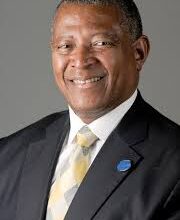New Concordia owner has ‘big plans’ for campus
Published 4:56 pm Thursday, January 3, 2019
Dr. Paul J. Kim, the dynamic minister who has been holding revival-style conferences in Selma on the former campus of Concordia College, finalized the paperwork to take ownership of the property Thursday morning.
According to Kim, he outbid 40 other interested parties to take control of the former university.
“So many people will come to this place from worldwide,” Kim said. “I will use the whole thing.”
Kim, originally from South Korea, where he runs a church and successful construction company, touched down in Selma just a few weeks ago after seeing the available Concordia property with ambitions of launching a variety of projects on the campus.
First and foremost, Kim plans to turn the former campus into what he calls a “mission retreat center,” similar to a place known as Prayer Mountain Korea. The church is a “Yoido Full Gospel Church” and, according to Kim, draws on the legacy of American Christianity.
Kim recalled how American missionaries ventured to the Korean peninsula to establish the church there.
“They died for the Korean church,” Kim said. “This missionary center is not only for Koreans. It is for Americans.”
As part of the mission center, Kim hopes to launch programs for young people and open the space up to the community.
Kim said the mission will initially employee between 20 to 30 people, though more will be necessary in the future as the program’s offerings expand.
In addition to this, Kim has visions of establishing a “contemporary music university” at the former Concordia location that will combine American music and the popular K-pop sound.
Kim said that among the 20,000 members of his Korean church are a number of prominent performers that he hopes to bring to Selma to work with up-and-coming musicians in the area.
Though Kim noted that the university, which will focus on religious training for future ministers and musicians, will take more than two years to establish, he is hoping to develop a satellite campus for the Reform Presbyterian University in Los Angeles of which he is a charter member.
Additionally, Kim has visions of establishing a program for training pilots.
“If it is possible, I want to launch a Pilot University here,” Kim said. “We need more vacant space.”
Kim said the need for more space stems from the necessity of having room to install runways on the campus as part of the pilot program, which he believes is feasible because of his close connections with aircraft companies in Korea and China.
On top of all this, Kim is confident that he can bring new companies to Selma, noting that land is both ample and affordable in the area, from Japan and Korea.
“We’ll try to create new jobs here,” Kim said. “We’ll collaborate here.”
Though Kim is excited about the possibilities for his mission in Selma, he took exception with one aspect of his recent acquisition – despite his hope to retain many of the historic artifacts housed on the campus, Kim was disappointed when the items at the school were removed and transported elsewhere.
“I want to show the young people the history of Selma,” Kim said. “These items are Selma history, not other cities. I don’t understand why they moved them.”
Aside from that, Kim is excited to get his operation up and running and is looking to do so as soon as possible.
“We will start immediately,” Kim said.




